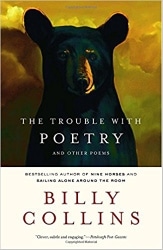Treachery or treacle?
Author: Billy Collins
 Superstardom and poetry. Somehow, one man has implausibly brought together these two exceedingly incompatible entities. Over the past three decades, poet Billy Collins has set the publishing world on its ear by writing bestselling poetry collections, one after another. And when he’s not writing or teaching, the 76 year-old luminary is reading on the radio or performing his works for sold out audiences who clamor for his attention. Not surprisingly, all this success has generated detractors who question the quality of his work, even arguing that what he writes really isn’t poetry at all. Somewhat perversely, I decided to read all the negative Collins criticism I could find as I read his 2005 work, The Trouble with Poetry and Other Poems. As an enthusiastic fan, it was both painful and enlightening.
Superstardom and poetry. Somehow, one man has implausibly brought together these two exceedingly incompatible entities. Over the past three decades, poet Billy Collins has set the publishing world on its ear by writing bestselling poetry collections, one after another. And when he’s not writing or teaching, the 76 year-old luminary is reading on the radio or performing his works for sold out audiences who clamor for his attention. Not surprisingly, all this success has generated detractors who question the quality of his work, even arguing that what he writes really isn’t poetry at all. Somewhat perversely, I decided to read all the negative Collins criticism I could find as I read his 2005 work, The Trouble with Poetry and Other Poems. As an enthusiastic fan, it was both painful and enlightening.
“It’s that willingness to slow down and examine the mysterious bits of fluff in our lives that is the poet’s interest.”
This is Collins’ simple goal and he certainly is on task with this collection, from the trivialities of a lanyard made at summer camp to the lives of sheep. But it’s this seeming lack of depth that draws criticism, begging the question. How do you define a good poem? Is it the topic? Word choice? Big ideas? Small ideas? Must it be indecipherable, cryptic and obscure? Does it have to be painful to write and read? If more than six people understand a poem do we have to call it something else? As I read criticism of Collins’ friendly, relaxed and accessible style, I can’t help but get the impression that some of his critics think there’s a certain nobility in being a loser. If no one reads your poem – or understands it – does that somehow make the work more pure or artistic?
These kinds of questions pervade the criticism of any art genre, but maybe the definition of a poem can be simple. Concise entertainment or illumination with words. Does it need to be more complicated than that? And it’s by this measure that Collins has been so successful. He consistently produces clever works that amuse and capture the imagination of countless readers, from school kids who couldn’t care less about artistry, to poetry fans older that he is.
In “The Introduction” he gently pokes fun at the impenetrable and incomprehensible poetry that some of his less famous critics appear to favor. Without a doubt, much of Collins’ popularity is based on his accessibility. He avoids intimidation, which so often seems to be the greatest obstacle poetry readers face. If there’s one word that seems to come up again and again in criticism of his work, it’s accessibility, which is seemingly viewed as a liability.
Why is Billy Collins’ poetry so popular? Maybe it’s because you know where you are right off the bat. You’re seated at the kitchen table, a park bench or the chair at the window. It’s grounded in real everyday experiences, making his work something everyone can relate to. Unlike other poems, maybe the ones they were assigned in school, readers don’t have to approach Collins’ poems with trepidation or anxiety. His approachable charm is right there on the page. It’s easy to relax when you’re reading a Collins poem.
Not surprisingly, the man’s success has prompted complaints from some critics who feel that his light-hearted approach to the art demeans the institution. He’s not deep enough. He’s not inscrutable. He’s not good enough. His success somehow deprives other struggling poets of the oxygen they need to survive. His financial success sullies the purity of the art.
But does his popularity represent an obstacle or an opportunity? I would argue that the millions of eyes that would otherwise ignore poetry are drawn to his work and are all the more likely to read other poets in the future. Should poetry promoters belittle and criticize him or should they encourage further adventures? Collins himself has certainly done his fair share when it comes to the promotion of poetry in his many tours across the country.
Of course, not every poem Collins includes in The Trouble with Poetry is great, but overall the experience is wonderfully entertaining. In the end, his affable and welcoming style is what keeps me coming back and this collection has it in spades. I can confidently recommend it for anyone who has enjoyed his other works. Do you have to be cynical and anguished to be a great poet, writer, musician or painter? Some seem to think so, but hopefully Collins will keep on proving them wrong, one poem at a time.
— D. Driftless
poet photo by Suzannah Gilman
Some of the criticism I surveyed:
Wages of Fame: The Case of Billy Collins (Ernest Hilbert – Contemporary Poetry Review 2006)
An Apology for Poetry, or, Why Bother With Billy Collins? (Paul Stephens – Drunken Boat 2002)
My reviews of other Billy Collins collections:
Aimless Love / The Art of Drowning / Ballistics / Picnic, Lightning
[AMAZONPRODUCTS asin=”037550382X”]
- Best Non-Fiction of 2016 - February 1, 2017
- Little Free Library Series — Savannah - May 22, 2015
- Little Free Library Series — Wyoming - November 30, 2014


